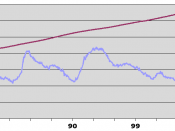In our current turbulent economic environment, to be successful, firms must be flexible. They must be able to shift production and resources to meet changing markets and customer demand. Therefore, they must have employees that possess the skill and training to perform a variety of different tasks. Historically, a lack of employee flexibility has been the cause of the downfall of a number of organisations.
On a broader front, the implementation flexible workforce, or lack there of, could be the difference in competing on the international stage, particularly with the advent of globalization. Thus, 'labour market flexibility,' as a theoretical framework, is an issue that holds great significance in the analysis and assessment of the impact of globalization on labour market changes.
From the Australian perspective, labour market flexibility has become more evident through the decentralisation of the industrial relations system, the reduction of collective arrangements, the declining density of trade unions, the rise in numerically flexible employment arrangements and the erosion of the "model" employer role of the government.
As Burgess and Watts (1999) suggest, "within this neo liberal policy regime the standard employment model has all but disappeared. In its place insecure and inferior employment arrangements are flourishing. In this context it is not surprising that workforce polarization is on the increase." (p.2)
This essay will identify what is labour market flexibility, highlight its forms and substantiate its relevance in the Australian labour market.
'Labour Market Flexibility' is defined as the "the ability and willingness of institutions and individuals in the labour market, employers as well as workers, to respond appropriately to the economic and social needs of the country." (National Labour Consultative Council, 1987, p.1) Stroper and Scott, 1990 identify it is as "a logic of tailoring labour input in production to shifting levels and...


